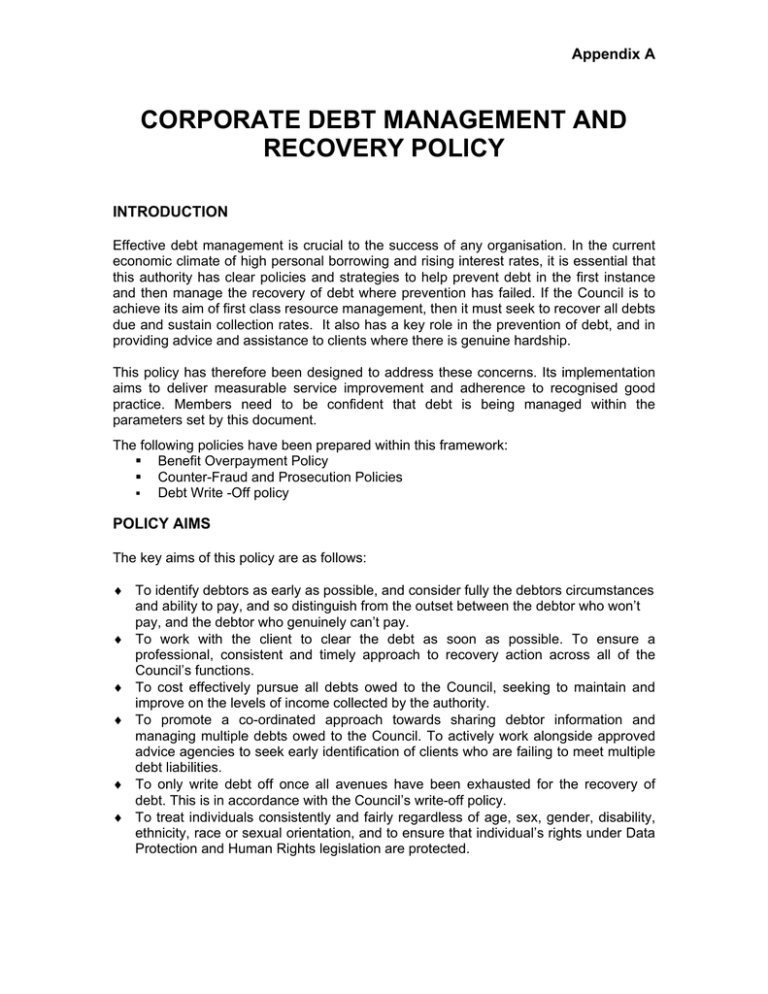CORPORATE DEBT MANAGEMENT AND RECOVERY POLICY Appendix A
advertisement

Appendix A CORPORATE DEBT MANAGEMENT AND RECOVERY POLICY INTRODUCTION Effective debt management is crucial to the success of any organisation. In the current economic climate of high personal borrowing and rising interest rates, it is essential that this authority has clear policies and strategies to help prevent debt in the first instance and then manage the recovery of debt where prevention has failed. If the Council is to achieve its aim of first class resource management, then it must seek to recover all debts due and sustain collection rates. It also has a key role in the prevention of debt, and in providing advice and assistance to clients where there is genuine hardship. This policy has therefore been designed to address these concerns. Its implementation aims to deliver measurable service improvement and adherence to recognised good practice. Members need to be confident that debt is being managed within the parameters set by this document. The following policies have been prepared within this framework: Benefit Overpayment Policy Counter-Fraud and Prosecution Policies Debt Write -Off policy POLICY AIMS The key aims of this policy are as follows: ♦ To identify debtors as early as possible, and consider fully the debtors circumstances and ability to pay, and so distinguish from the outset between the debtor who won’t pay, and the debtor who genuinely can’t pay. ♦ To work with the client to clear the debt as soon as possible. To ensure a professional, consistent and timely approach to recovery action across all of the Council’s functions. ♦ To cost effectively pursue all debts owed to the Council, seeking to maintain and improve on the levels of income collected by the authority. ♦ To promote a co-ordinated approach towards sharing debtor information and managing multiple debts owed to the Council. To actively work alongside approved advice agencies to seek early identification of clients who are failing to meet multiple debt liabilities. ♦ To only write debt off once all avenues have been exhausted for the recovery of debt. This is in accordance with the Council’s write-off policy. ♦ To treat individuals consistently and fairly regardless of age, sex, gender, disability, ethnicity, race or sexual orientation, and to ensure that individual’s rights under Data Protection and Human Rights legislation are protected. Appendix A SUPPORTING THE COUNCIL’S CORPORATE PRIORITIES This Policy supports the Council’s drive towards continuous improvement whilst recognising equality and diversity issues. It is reflective of the values and standards adopted by this Council within the Corporate Plan and contributes towards the following priorities: First Class Resource Management – To manage the Council’s resources efficiently and effectively and to make sensible choices in setting priority led service budgets which do not burden council tax payers with unnecessary or unjustifiable costs. Better Access to Council Services – To improve customer service through all access channels, and to move towards a fully integrated front office with multi-agency enquiryhandling capacity. The Policy also supports the wider aim of improving service provision through partnership working by seeking to maximise the benefits of external debt advisory agencies. DEBTS COVERED BY THIS POLICY The main section involved in debt recovery are Finance The debts involved are primarily: • Council Tax • National Non Domestic Rates • Overpaid Housing Benefit • Sundry Debts The policy will apply to all sections of the Council and focus on collecting the charge set rather than how the charge is arrived at. Ability to pay is a paramount concern when considering debt recovery. For Council Tax a statutory benefit is provided on application, which is designed to offset the effects of low income on ability to pay. Charging policy, statutory or discretionary will never completely remove the problems of people and families on low incomes. The approach to recovery must therefore be sensitive to individual circumstances and take into account multiple debts owed to ensure that arrangements are manageable. The primary aim remains the recovery of debt and improved data sharing will support this aim. THE LEGAL AND POLICY FRAMEWORK FOR RECOVERY The Council has a legal duty to ensure cost-effective billing, collection and recovery of all sums due to the Council. This policy is in addition to existing legislation and will provide a framework for procedures to be developed and improved. This debt recovery policy is concerned primarily with the recovery of debts prior to legal action being taken, but the principles should still be applied wherever appropriate even if litigation has commenced. Appendix A Local Taxation Council Tax recovery procedures are laid down by statute in The Council Tax (Administration and Enforcement) Regulations 1992 and subsequent amendments. National Non-Domestic Rates recovery procedures are laid down by statute in The Local Government Finance Act 1988 and subsequent regulations and amendments. The Council appoints bailiffs to recover local taxation arrears in accordance with our own code of conduct. Only certificated bailiffs can levy distress for local taxation and fees charged to the debtor are governed by legislation. Housing Benefits Housing Benefit overpayments are reclaimed in accordance with Regulations 98-105 of The Housing Benefit (General) Regulations 1987 (as amended). The Benefit Overpayment Policy sets out the basis under which these debts are recovered. Miscellaneous Income Sundry Debt arrears are collected within a well-established framework. The Council does appoint collection agencies to collect unpaid debts on our behalf. On certain debts, interest may be charged for late payment. The debtor will be made aware of any additional costs in advance so that they have the opportunity to avoid this wherever possible. Customers will also be made aware of legal fees and costs that will be incurred for non-payment. THE POLICY • Full names, contact address and a phone number will be established wherever possible prior to service provision or invoicing/billing. • All Council bills and invoices will be raised as soon as practicable on a daily basis and will include clear, relevant and full information as to: − What the bill is for; − When payment is due; − How to pay; − How to contact us if there is a query in relation to the bill or in relation to making payment. • All letters and reminders will: − Be written in plain English; − Explain fully what has been agreed and the consequences of non-payment; − Include appropriate contact details. • Debtors will be encouraged to make prompt contact if they disagree with a bill or have difficulty in making payment on time. Contact can be made by: − Telephone − Letter − Email − Fax − In person at the Council Offices. Appendix A • Problems and bill discrepancies raised will be resolved as quickly as possible to prevent unnecessary delays in payment and incorrect debits. • All debtors seeking help due to financial difficulties will: − Be given the opportunity to have their ability to pay assessed by the relevant collection unit; − Be invited to provide details of their means by listing their income and expenditure. (Evidence to confirm the accuracy of the means statement will be requested if necessary); − Be invited to use the money and debt advice services available from the Citizens Advice Bureau (CAB) (see Addendum A); − Be asked if they have other debts owing to the Council that they also wish to be considered; − Be given access to the Council’s interpreter service if required. • If legal proceedings have already commenced, consideration will be given to whether the debt can firstly be attached to earnings or benefits, the priority of the debts owed and the level of repayments currently being made. • If a specific recovery action has already commenced e.g. attachment of earnings or bailiff action, the action taken will usually continue. However, any arrears not included in the action will be considered in line with existing arrangements and this policy. • If it is found that the debtor has the ability to pay, but refuses to pay, then recovery action will continue promptly within the existing arrangements for the type of debt. • If it is found that the debtor is suffering severe hardship or has difficulty managing their own affairs, the following will be considered: − Can we reduce the debt? Are they entitled to take up relevant benefits, discounts, exemptions and reductions to minimise the potential for debt accrual? − Does the debtor owe money to other Council services? If so the debtor will be advised that, with their consent, all their Council debts may be taken into consideration when deciding on an arrangement. The advantage to the debtor in making a common arrangement is that they may save time and costs. However, it is for the debtor to decide if this is an option they want to pursue. − This will suspend additional costs to allow for either the Council’s Help and Advice team or the CAB to assist the debtor within an agreed period of time, and if necessary, prepare a financial statement for them. • If a debtor takes up the offer to deal with all Council debts collectively, the various services will communicate the debtor’s details confidentially between themselves and will endeavour to take a holistic approach to collection without prejudice to their own service. An officer will be identified as a single point of contact for the debtor and will act as a liaison between services • Where there is no continuous liability a special long-term arrangement may be made according to the ability to pay and the existing recovery provisions such as an attachment of earnings. Appendix A • Where liability is continuous e.g. Council Tax, any arrangement made will normally require payments over and above the ongoing monthly liability. Future instalments must be paid when due as a condition of the arrangement. Longer term arrangements for older arrears will be strictly monitored and reviewed. If there is no improvement by the review date and if the amount payable cannot be reduced (by awarding Council Tax Benefit etc), the Council will reserve the right to continue with legal action, and in the case of Local Taxation, obtain a liability order from the magistrates’ court. This is to protect the Council’s interests and prevent the debt from becoming statute barred and irrecoverable. Nevertheless regular contact with the debtor will be made and part payments will be accepted to reduce the overall debt. Furthermore it is not in the debtor’s best interest to have a long term arrangement when liability is continuous, since the level of debt will increase as time goes by and the debtor’s situation deteriorate rather than improve. • If a debtor is receiving Income Support or Job Seekers Allowance, this will usually limit the ability to pay to no more than the amount that can be paid directly to creditors by the Department of Work and Pensions (DWP). Where appropriate, a separate agreement will be made for additional debts and liability orders depending on the individual’s circumstances. • Debtors given time to pay will be advised to contact the Council immediately should they experience a change of circumstances affecting their ability to pay. This is to discuss the options available to prevent recovery action and additional costs. • If a debtor fails to co-operate by: − Refusing to provide details of their means, and/or − Not consenting to multiple debts being dealt with together, and/or − Failing to pay a special arrangement on time without contact, then recovery action will be taken promptly in the normal way. LIMITATIONS ON DEBT RECOVERY All internal and external bailiffs appointed will be required to work to a code of conduct. A copy is attached at Addendum B. PROCEDURES AND TRAINING This policy will be made available to all staff dealing with income collection and recovery. This will be reinforced with training and management supervision of all staff involved in collecting debt. MONITORING Each section will be responsible for ensuring that this policy is adhered to and effective. Management information will be required for each debt stream on a monthly basis to be co-ordinated by the Revenues Section in a format to be agreed. Appendix A Addendum A to the Corporate Debt Management and Recovery Policy REFERRAL OF DEBTORS TO AND FROM THE CITIZENS ADVICE BUREAU An informal system of referral is in place, whereby debtors seeking help due to financial difficulties can obtain advice from one of the Citizens Advice Bureaux. This will be offered: • During interview • During telephone conversation • In leaflets, reminders and other recovery documents issued by the Council • On the Council’s website. The Council currently makes a £66,715 contribution to CABs in North Norfolk. ADVICE ON PRIORITY DEBTS FROM THE CITIZENS ADVICE BUREAU The following advice is supplied to debtors by the Citizens Advice Bureau for information. It does not override this corporate debt policy. Priority debts Priority debts are debts owed to creditors who can take the strongest legal actions against you if you do not pay. It is not the size of the debt that makes it a priority, but what the creditors can do to recover their money. Priority debts are: 9 Mortgage arrears 9 Rent arrears 9 Income Tax and VAT 9 Fines 9 Maintenance and child support 9 Council Tax and Rates 9 Fuel debts 9 Hire Purchase for goods that are essential e.g. a car needed for work If you have any of these debts, you must deal with them before you offer to repay any of your non-priority debts. Non-priority debts Examples of non-priority debts are: 9 Credit Card and Store Card arrears 9 Catalogue arrears 9 Bank overdrafts and loans 9 Benefits overpayments 9 Hire Purchase for goods that aren’t essential e.g. a television 9 Money borrowed from family and friends You cannot be imprisoned for not paying non-priority debts. You are unlikely to lose your home or your essential goods. However, if you make no offers to pay, without explaining why, the creditors will take you to court. If you still fail to pay when the court has ordered it, the creditors can take further action – for example, they can get another court order allowing them to send bailiffs in. Appendix A Addendum B to the Corporate Debt Management and Recovery Policy CODE OF CONDUCT FOR BAILIFFS Any Bailiff employed either directly or indirectly by this Council shall adhere strictly to the provisions contained in the legislation relevant to distress and any other instructions laid down by this Council as may be in force at the relevant time. The Bailiff will not raise or charge any costs or fees in excess of the costs and fees allowed under any Regulations in force at the relevant time. The Bailiff shall not represent himself as an employee or representative of the Council, unless directly employed by the Council. • The bailiff shall not follow any irregular practices with regard to levying or attempting to levy distress or in the execution of warrants and shall not cause nuisance or trespass in the execution of his duties. • The Bailiff may conduct his business out of normal office hours, (8:30 5:00) but shall at all times consider the reasonableness of the time and the debtor’s personal and business movements. • The bailiff shall not discriminate against or in favour of a debtor on the grounds of ethnic origin, sex, religion, status, race, colour, creed or disability. • No distress is to be undertaken without prior authorisation, preferably in writing, by the Client, against the long term sick, the disabled (either mental or physical) those in hospital, those recently bereaved, those on Income Support, or those where in the opinion of the attending bailiff to do so would cause the Council unwarranted publicity. • No committal actions are to be instituted against the long term sick, the disabled (either mental or physical) those in hospital, those recently bereaved, those on Income Support, or those where the debt is less than £100.00 except with the prior written authorisation of the Client. • All bailiffs are required to be Certificated Bailiffs of the County Court and either members of the Association of Certificated Bailiffs or working towards it and shall not have, nor permit any of his personnel to have, any criminal convictions or disqualification including those under the Rehabilitation of Offenders Act 1974 and shall sign a declaration to that effect. • The bailiff shall indemnify the Council against any and all actions arising from any act or omission not occasioned by the Council and those where the bailiff was aware that there was an act or omission prior to the action taking place. Appendix A






